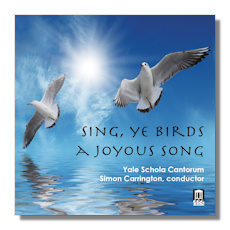
The Internet's Premier Classical Music Source
Related Links
-
Bennett Reviews
Gibbons Reviews
Tallis Reviews
Taverner Reviews - Latest Reviews
- More Reviews
-
By Composer
-
Collections
DVD & Blu-ray
Books
Concert Reviews
Articles/Interviews
Software
Audio
Search Amazon
Recommended Links
Site News
 CD Review
CD Review
Sing Ye Birds, a Joyous Song

- John Taverner: Mass "Western Wind"
- Richard Rodney Bennett: The Glory and the Dream *
- Orlando Gibbons: **
- Glorious and Powerful God
- Second Evening Service
- Thomas Tallis: Te lucis ante terminum
* Thomas Murray, organ
** Lucas Wong, organ
Yale Schola Cantorum/Simon Carrington
Delos DE3458
This latest release of the Yale Schola Cantorum comes from a live concert in January 2010. Having founded the Yale Schola Cantorum in 2003, conductor Simon Carrington has every reason to be proud of the ensemble that he has nurtured. A diverse and engaging program has been preserved here, featuring a great Renaissance and 20th-Century English choral music. Beautifully recorded by Delos, and with full texts complimenting informative liner notes, this is a clear winner for anyone who loves choral music.
John Taverner (not to be confused with the also-English, 20th-Century composer John Tavener) was active during the very early stages of the Reformation in England. His "Western Wind" Mass is based on a secular tune of the same name, something that was unusual in choral music in England at the time. Also unusual is the harmonic complexity here; the composers' own religious beliefs and intentions remain unknown. No matter. This is lovely, and happily quite brief. Curiously for a Mass, it's missing a Kyrie, but the "Western Wind" hymn is included here.
Richard Rodney Bennett set the text of The Glory and the Dream from William Wordsworth's Intimations of Immortality from Recollections of Early Childhood. More specifically, the text is an ode, and speaks of the wonders of childhood. It makes for great music, and Bennett uses the organ and choir with equal effectiveness to evoke this awestruck feeling. By 2010, the composer was not well enough to travel to New Haven, Connecticut to attend this concert, but Carrington (a personal friend) conducts with enormous conviction and great personality. Bennett has since passed, and this is a touching memento to his art.
Orlando Gibbons returns us squarely to the Renaissance with two of his popular religious pieces. Glorious and Powerful God is typical of the time, intoned verses with a choral refrain (O thou, the Central Orb is another prime example). The Second Evening Service shares this format, save for the lack of a set choral affirmation and a rotating set of soloists. These texts, set in English to suit the needs of a suddenly de-Latinized church, are prime examples of the English choral tradition. Thomas Tallis' music came later, during a time which saw Latin permitted in court settings. While it incorporates some of the musical characteristics of the English Church, it also shows a willingness to look back to the past, incorporating chant. All of this music is beautifully sung. Both organists are distinguished, and Simon Carrington remains a masterful conductor. For a wealth of great music (and much history and smart programming, too), this may be an essential purchase.
Copyright © 2015, Brian Wigman




















